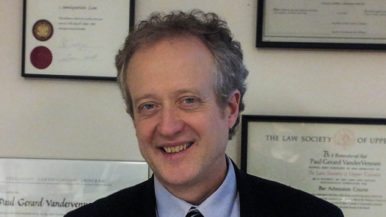Q&A: Urbanist Richard Florida, on rising home prices and Donald Trump

With Jane Jacobs gone, there aren’t too many celebrity urban-studies theorists left in the world—but Richard Florida is one. From his perch at the University of Toronto, where he has run the Martin Prosperity Institute since moving to Canada from the U.S. in 2007, he has promulgated his theories about the way so-called “creative class” workers (high-earning types whose jobs require them to be inventive, or to draw on deep reserves of knowledge) drive prosperity in the urban areas they populate.
His latest book, The New Urban Crisis, explores a darker aspect of the creative class. Florida argues that the same forces that make major population centres attractive to elite workers also cause deep economic disparities, leading to inequality and segregation throughout the world. We spoke with him about his book, and what’s in store for Toronto and other cities during the reign of Donald Trump.

Just to get this out of the way: how would you rate Donald Trump’s performance on the urban affairs file so far?
How far can you go past zero? Negative infinity? If Rob Ford was the most anti-urban mayor in human history, Donald Trump is the most anti-urban president. You couldn’t even imagine someone less equipped for the job.
In your new book, you write that the same forces that draw high-earning, creative-class workers to cities are also creating terrible inequality and economic hardship for people in lower-paying service jobs.
Absolutely. It’s that competition for very scarce space that’s causing divides. The creative class is able to navigate those divides better than others—but the divides are not caused by the creative class. They’re caused by the clustering of economic activity in cities. And I think one of the points of the book is, we don’t want to throw the baby out with the bathwater. We don’t want to reduce this clustering force. We don’t want to make Toronto grow less. Toronto is key to Canada’s prosperity. We want to make sure we can distribute prosperity better, and let more people share in it.
But in the past, your prescription was always: build bike lanes, do other progressive things, lure creative-class workers to your city and benefits will follow. Whereas now your message is a lot more tempered. Are you contradicting yourself?
I wouldn’t say it that way. I think Toronto needs many more bike lanes. It needs more parks. It needs more of these small-scale investments, which everyone from Jane Jacobs to myself say make for better urbanism. But Toronto also needs to deal with the inequality that comes from the extreme clustering of economic activity in a city. So, it’s not either/or. It’s not bike lanes or inequality. It’s not better parks or an economic divide. It’s doing more of the things that build a better and more inclusive urbanism. That means building more housing and upgrading service jobs.
So this book doesn’t invalidate any of your previous work on the creative class?
I think it’s an extension, to deal with the dark side of this incredible re-urbanization, and the economic divide that it’s bringing about. But no, that doesn’t mean that we stop doing the things that make for a better city. Rob Ford, for example, would have argued that things like bike lanes confer benefits on an urban elite, but I think a much more balanced and tempered view is that bike lanes and pedestrian friendliness make a better city for everyone.
Speaking of Rob Ford, you were a frequent and outspoken critic of his. Did that have anything to do with your decision to write a book about the dark side of urban elitism?
I think Rob Ford was one of the big things that led me to write this book. You know, I had moved to Toronto, perhaps naively, seeing it as a bastion of Jane Jacobs–style urbanism. I saw it as a place that was open to diversity, open to different people. A place that had healthcare for everyone, that made a commitment to social housing. Seeing Rob Ford become mayor of this progressive-minded, tolerant community made me realize that these divides were growing deeper, and were causing an anxiety and a resentment that I had not anticipated.
I say in the book that I thought if Rob Ford could happen in Toronto, more and worse could happen in many other places. And, in fact, we got Brexit. We got Donald Trump. I think these are all a product of winner-take-all urbanism, and the fact that urban concentration confers very uneven benefits on neighbourhoods. If Rise of the Creative Class was a product of my experience looking at how Pittsburgh could revitalize itself, I think in many ways The New Urban Crisis is a product of me trying to grapple with the contradictions of Toronto.
If endlessly luring creative-class workers isn’t the only solution, what should a city like Toronto be doing now to improve itself?
I think Toronto is going to get an even bigger influx of the creative class. With the rise of Trumpism, more and more people who might otherwise have gone to the United States are going to come to Canada. We’re going to see American tech companies invest more and more in Toronto. And if we think the housing affordability and economic divide we see today is bad, it’s going to grow ever more gaping. So, I think we need a strategy for inclusionary prosperity. I think we need a strategy to make sure that more and more people in Toronto can participate. We’ve got to build more. We’ve got to renew our commitment to affordable housing. We have to make a real commitment to creating service jobs. We’re not going to succeed as a city when 66 per cent of our workforce falls farther and farther behind, while a third sees their money grow. Finally, we have to make a massive investment in public transit.
In the book, you describe how the benefits of being in a so-called superstar city, like Toronto, mainly accrue to the landowning class. Do you see a way of making Toronto more affordable without decimating the real estate market?
People who own land and property in Toronto have made a killing over the past 10 or 20 years. It’s unbelievable. I often say that the house I bought in Toronto is the best investment decision I ever made. We’ve got to increase the wages and salaries of those at the bottom. We’ve got to build more affordable housing, so that we can make prices level off, if not come down. We’re going to have to subsidize the truly disadvantaged. And we’ve got to build transit. One of the reasons New York has been able to scale to a metro of 23 million people is that people can live in an outlying suburb, where they’re probably spending a few hundred thousand dollars for a nice single-family home. That’s unheard of in Toronto. So, should we have less development? No. We need to strengthen the economy but spread the benefits.
You’re talking about a holistic approach. Which is interesting, because often what you see being proposed by politicians is a quick fix, usually involving some form of new property tax.
I think Toronto could take an increase in the property tax. By North American standards—not just Ontario standards—we pay a very, very, very low property tax.
You’re not an investment advisor, and you’re not a real estate guru, but I’m wondering: knowing what you know, do you have any advice to people in Toronto who are thinking about getting into the housing market?
It’s a long game, so you never know. This may be a bubble and it may burst, but I would say real estate in a city like Toronto, or New York, or London is a really good investment. People who have the resources and the money are making those investments. The other thing is, with the United States going through Trumpism, you’re going to have a redirection of some investment to Toronto. We’re going to get some of this talent, technology and business flowing to us, and it’s going to make the new urban crisis deeper and more challenging.
What do you think will happen to American cities under Trump?
I’m writing about this now, so I don’t want to say much before I dig deeper into the data. But you know, if Trump hangs on for four years—or, lord knows, eight years—he could do real damage, because America’s great cities are its immigrant-open cities. We saw it when Bush was president, in Vancouver: tech companies like Microsoft opened laboratories. Maybe Toronto wasn’t ready ten years ago, but now we’re one of the great cities in the world. So I think more is coming our way. We just have to be ready for it. This is going to put more pressure on our real estate market, not less.





